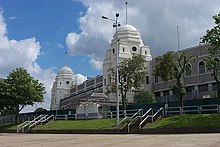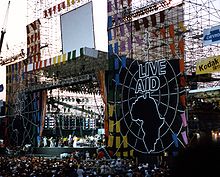Live Aid
The event was organised by Bob Geldof and Midge Ure to raise further funds for relief of the 1983–1985 famine in Ethiopia, a movement that started with the release of the successful charity single "Do They Know It's Christmas?"
[5] Geldof has said, "We took an issue that was nowhere on the political agenda and, through the lingua franca of the planet – which is not English but rock 'n' roll – we were able to address the intellectual absurdity and the moral repulsion of people dying of want in a world of surplus.
In October 1984, images of hundreds of thousands of people starving to death in Ethiopia were shown in the UK in Michael Buerk's BBC News reports on the 1984 famine.
[12] The reports featured a young nurse, Claire Bertschinger, who, surrounded by 85,000 starving people, told of her sorrow of having to decide which children would be allowed access to the limited food supplies in the feeding station and which were too sick to be saved.
On the final night at Wembley, 22 December 1984, an impromptu gathering of some of the other artists from "Band Aid" joined Culture Club on stage at the end of the concert for an encore of "Do They Know It's Christmas?"
Tony Verna, one of the inventors of instant replay, was able to secure John F. Kennedy Stadium through his friendship with Philadelphia mayor Wilson Goode and was able to procure, through his connections with ABC's prime time chief, John Hamlin, a three-hour prime time slot on the ABC Network and, in addition, was able to supplement the lengthy programme through meetings that resulted in the addition of an ad-hoc network within the US, which covered 85 per cent of TVs there.
[22] Problems of synchronisation meant the only practical solution was to have one artist, likely Bowie at Wembley, mime along to prerecorded vocals broadcast as part of the live sound mix for Jagger's performance from Philadelphia.
[22] Veteran music engineer David Richards (Pink Floyd and Queen) was brought in to create footage and sound mixes Jagger and Bowie could perform to in their respective venues.
Due to the time lag (the signal would take several seconds to be broadcast twice across the Atlantic Ocean), Richards concluded there was no way for Jagger to hear or see Bowie's performance, meaning there could be no interaction between the artists, essentially defeating the whole point of the exercise.
Instead, Jagger and Bowie worked with Richards to create a video of the song they would have performed, a cover of "Dancing in the Street", which was shown on the screens of both stadiums and broadcast as part of many TV networks' coverage.
Due to the constant activities in both London and Philadelphia, the BBC producers Only Broadcast two songs from the reunion of Crosby, Stills, Nash & Young after 10 pm; the same applied to Rick Springfield and REO Speedwagon.
[3][38][39] According to the BBC's presenter David Hepworth, their performance produced "the greatest display of community singing the old stadium had seen and cemented Queen's position as the most-loved British group since the Beatles".
[43] According to Ultimate Classic Rock, Phil Collins also "performed an especially crowd-pleasing selection of songs",[25] and John Illsley of Dire Straits recalled, "It was a very special feeling to be part of something so unique.
[47] While performing "Let It Be" near the end of the Wembley show, the microphone mounted to Paul McCartney's piano failed for the first two minutes of the song, making it difficult for television viewers and the stadium audience to hear him.
[citation needed] Petty stated the song was a last-minute addition when the band realised that they would be the first act to play the American side of the concert after the London finale and "since this is, after all, JFK Stadium".
[56] The JFK portion included reunions of Crosby, Stills, Nash & Young, the original Black Sabbath with Ozzy Osbourne, the Beach Boys with Brian Wilson, and surviving members of Led Zeppelin, with Phil Collins and the Power Station (and former Chic) member Tony Thompson sharing duties on drums in place of the band's late drummer John Bonham (although they were not officially announced by their group name from the stage but were announced as Led Zeppelin on the VH1 10th Anniversary re-broadcast in 1995).
Geldof had previously refused to allow the video to be shown due to time constraints and had only relented when Bowie offered to drop the song "Five Years" from his set as a trade-off.
"[66] Although Dylan's comments were criticised, his remark inspired fellow musicians Willie Nelson, Neil Young and John Mellencamp to organise the Farm Aid charity, which held its first concert in September 1985.
"[72] BBC coverage co-host Andy Kershaw was heavily critical of the event in his autobiography No Off Switch, stating, "Musically, Live Aid was to be entirely predictable and boring.
As they were wheeled out – or rather bullied by Geldof into playing – it became clear that this was another parade of the same old rock aristocracy in a concert for Africa, organised by someone who, while advertising his concern for and sympathy with, the continent didn't see fit to celebrate or dignify the place by including on the Live Aid bill a single African performer."
Kershaw also described the event as "irritating, shallow, sanctimonious and self-satisfied" for failing to confront the fundamental causes of the famine and being "smug in its assumption that a bunch of largely lamentable rock and pop floozies was capable of making a difference, without tackling simultaneously underlying problems".
[78] Philadelphia named it "one of the worst rock-and-roll reunions of all time", with Victor Fiorillo writing: "I'd like to be able to blame all of the awfulness on anaemic Phil Collins, who sat in on drums, and Page himself later fingered the Genesis drummer for screwing up the set.
[80] Geldof responded by deriding both the articles and Médecins Sans Frontières, who had been expelled from the country, and reportedly saying, "I'll shake hands with the Devil on my left and on my right to get to the people we are meant to help.
Bono responded that corruption, not disease or famine, was the greatest threat to Africa, agreeing with the belief that foreign relief organisations should decide how the money is spent.
[93] Huey Lewis and the News were scheduled to play the Philadelphia leg and were in some of the promotional material but decided on 28 June to pull out over concerns that the money raised by relief efforts thus far had not been reaching those it was intended to help.
[97] Marillion, riding high in the UK charts that summer with their Misplaced Childhood album and "Kayleigh" single, missed out on an invitation to perform at Wembley because their manager had deemed it not worthwhile for singer Fish to participate in the "Do They Know It's Christmas?"
I recall that Tears for Fears, who made a musical and artistic decision to pull out of the concert, were subsequently accused by Geldof of killing children in Africa—what a shockingly irresponsible and stupid attitude to take.
The screening was held at the Odeon Cinema in Kensington, London and included guests such as Brian May, Anita Dobson, Roger Taylor, Bob Geldof and partner Jean Marie, Annie Lennox, Midge Ure, Michael Buerk, Gary Kemp and The Darkness.
"[141] Also, in the US finale, the original USA for Africa studio track for "We Are the World" was overlaid in places where the microphone was absent (consequently, it includes the vocals of Kenny Rogers and James Ingram, two artists who did not even take part in Live Aid).
[167][168] In August 2024, opening for Taylor Swift's Eras Tour at Wembley Stadium, Hayley Williams, lead vocalist of Paramore, tributed Freddie Mercury's Live Aid performance.





